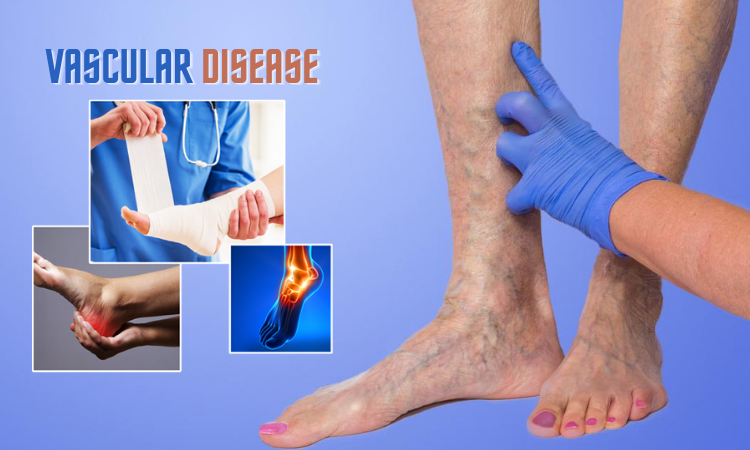You know that your circulatory system, which includes all the arteries and veins that do the critical job of transporting blood throughout the body. But, just imagine what happens when a blood clot or buildup plaques in any spot occurs, or any of the veins stop working? Such problems can restrict the flow of blood and throw the whole system off.
Fortunately, there are some good surgical approaches for vascular diseases, which can be treated on time. Otherwise, this can cause some severe or critical complications.
In this article, we will read about the types of vascular diseases and people who can be affected by the disease. This will help you to know when you can be at risk for vascular problems, and what treatments or surgeries are available to treat vascular diseases.
Vascular Disease
Any condition that affect the blood vessels, veins, arteries, and tiny capillaries that carry blood is known as vascular disease. Well, this also covers lymphatic system, which is the small vessels through which lymph (a fluid), containing infection-fighting white blood cells travel from the tissues into the blood. There is a long list of the conditions of vascular diseases, some of which can be life-threatening are as follows: –
- Thoracic outlet syndrome
- Acute venous thrombosis
- Aortic aneurysm (abdominal, thoracic)
- Vascular malformations
- Varicose veins
- Peripheral artery disease (PAD)
- Critical limb ischemia
- Diabetes vascular disease and limb salvage
- Diseases of the aorta
- Visceral artery disease
- Dialysis graft and fistula management
- Non-healing wounds caused by vascular disease
- Carotid artery disease
Who is at risk for vascular problems?
There are many diseases or health conditions that occur as we grow older. Similarly, vascular disease also become common with age. But, the people who have history of vascular disease and heat disease are at higher risk.
Apart from them pregnant women are also affected with this. People with cardiac-conditions such as high-cholesterol and hypertension can also be affected by vascular disease.
It has seen that people who have unhealthy lifestyle like who drinks, smokes and consumes drugs are mostly affected with vascular disease. People who are obese or sedentary, or who routinely stand still or sit for long periods of time are also at higher risk of vascular problems or diseases.
When is surgery necessary for vascular problems?
It’s not necessary to have a surgery for vascular problems. It totally depends on the condition of the patient and severity of the problem.
Some people may need vascular surgery, whereas some do not need if their disease is diagnosed early. They can simply follow vascular surgeon’s advices for the treatment which simply includes takin medicines and making lifestyle changes. But, if the condition is becoming complicated then the doctor may advice for vascular surgery. Surgery can help people in improving the quality of their life. Also, it will help in relieving the pain and improving mobility.
What types of surgeries are available to treat vascular diseases?
Well, there are different vascular problems, but there are essentially two surgical approaches to treatment – Open Surgery and Endovascular Surgery.
Open surgery
This is the type of the surgery in which the vascular surgeon will make a long incision in order to have direct access to view and treat the problem.
Endovascular surgery
This is a minimally invasive and the most preferred approach of vascular treatment by the surgeons. This involves inserting a slender, flexible tube called asa catheter with medications or tiny instruments through the skin and into the blood vessel.But, there are some complex cases for which the surgeon may use a combination of minimally invasive and open approaches.
Here are some common types of vascular diseases that requires surgery: –
- Abdominal aortic aneurysm
- Peripheral Artery Disease (PAD)
- Varicose veins
Is there any risk of vascular surgery?
Like many other surgeries, vascular surgery also possess some risk factors. And the risks increases when the patient smokes, is obese, and has some serious health issues like chronic lung disease.
Well, there’s additional risk when the surgeon operates on chest or any major blood vessels.
What is recovery and follow-up like after vascular surgery?
Every patient is different and so that their conditions. Depending on the surgery and also the condition of the patient, he may spend a few days in intensive care unit and the hospital. After examining the patient carefully the doctor discharges the patient. Well, there are some varicose vein procedure that can be done by the surgeon on an outpatient basis.
As this is a chronic condition, many patients continue to follow up with their vascular surgeon in Delhi throughout their life.
But, always remember that you must consult an experienced and knowledgeable vascular surgeon in Delhi, who is willing to listen to your concerns and also help in achieving the results you want to achieve by recommending the right treatment you need.

